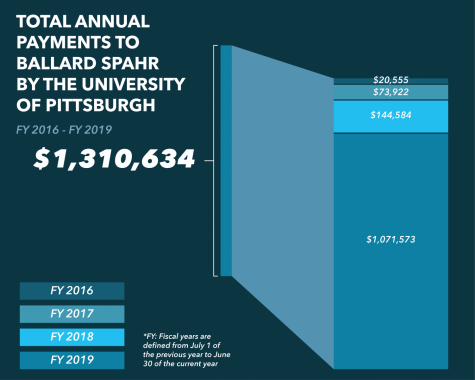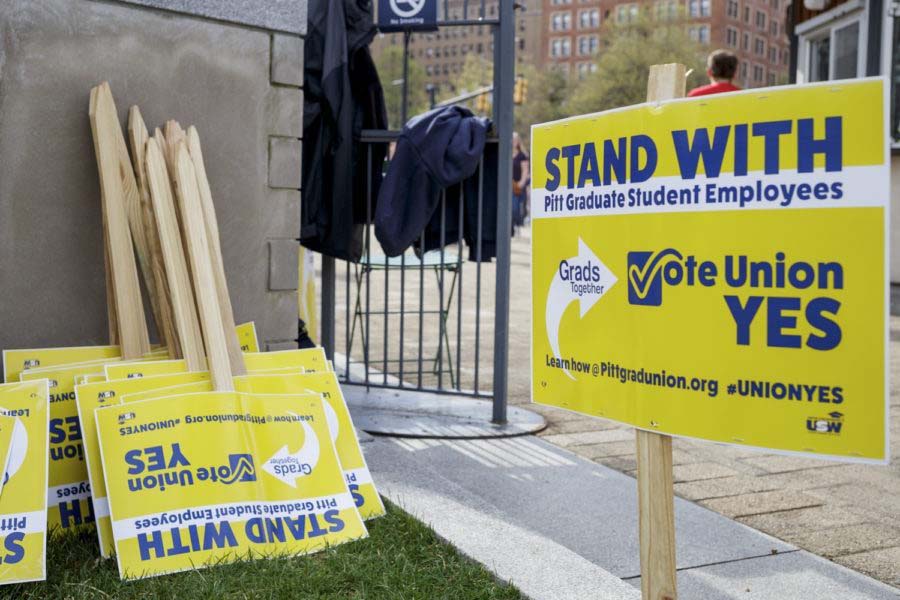Pitt’s bill for ‘union avoidance’ law firm passes $1 million
Emily Wolfe | Contributing Editor
Pitt’s Office of University Counsel paid Philadelphia-based Ballard Spahr, a “union avoidance” law firm, $1,071,573 in fees between July 1, 2018, and June 30, 2019, to provide legal support during the separate graduate student and faculty campaigns for unionization.
January 12, 2020
A “union avoidance” law firm continues to receive a large windfall of legal fees from Pitt, recently passing $1 million, according to University financial disclosure reports.
Pitt’s Office of University Counsel paid Philadelphia-based Ballard Spahr $1,071,573 in fees between July 1, 2018, and June 30, 2019, to provide legal support during the separate graduate student and faculty campaigns for unionization. The amount is more than seven times what Pitt paid during the previous fiscal year and is more than quadruple what Pitt paid during the previous three fiscal years combined.
According to its website, Ballard Spahr can “advise on employer rights and responsibilities during the critical pre-election period” and “work closely with management to design and carry out an effective election campaign.”
The annual financial disclosure reports are required by Pennsylvania’s education regulations, the Public School Code of 1949, which mandate that state-related universities provide a list of all goods and services contracts which exceed $1,000 in price every fiscal year. They show the University paid Ballard Spahr $20,555 in 2016, $73,922 in 2017, $144,584 in 2018 and now $1,071,573 in 2019, for a total of $1,310,634.

The University’s payments to Ballard Spahr increased to more than $1 million in 2019 from just $20,000 in 2016.
The reporting period included many significant events for the graduate student unionization campaign, including a narrow April 2019 election, a proposed Pennsylvania Labor Relations Board ruling in September 2019 that found Pitt guilty of three unfair labor practices during that election, to which the University later filed a formal exception in October 2019, and two rounds of hearings in October 2018 and May 2019.
The faculty unionization campaign also took major steps forward in their effort, submitting hundreds of signed authorization cards to show support for a union election. But the Pennsylvania Labor Relations Board ruled in April that the number of cards did not reach the minimum 30% needed, which the campaign promptly appealed, alleging the University sent the board an incorrect list of current faculty, packed with retirees and administrators. Following an investigation last October from The Pitt News, the University removed about 200 people from its list last December, and the board will hand down a final ruling on the list’s size in March.
Pitt spokesperson Kevin Zwick said Ballard Spahr has provided the University with expertise in many areas, including faculty and graduate student unionization, over the last 10 years.
“The University has engaged Ballard Spahr — one of many vendors in our partner network — on a variety of legal matters dating back to 2009,” Zwick said. “Moving forward, our longstanding support for faculty and graduate students will not change, regardless of how these efforts evolve.”
Provost Ann Cudd said at the September 2019 Board of Trustees meeting that the University was pleased with Ballard Spahr’s services, despite being charged in the proposed PLRB ruling with three unfair labor practices.
“We hire outside counsel for a variety of different things,” Cudd said. “I think that, all in, they’re doing a good job for us.”
But organizers with the two unionization campaigns attacked the payments as a waste of money that could be better spent elsewhere.
Pat Healy, a graduate student union organizer and graduate student in information science, said the University’s spending on Ballard Spahr is “unconscionable.”
“The University’s grad students and faculty members simply want a say in their workplace, which is something that every worker and every educator deserves,” Healy said. “It’s a shame that Pitt continues to fight rather than cooperate with its workforce.”
Tyler McAndrew, a faculty union organizer and visiting lecturer in the English department, said he was “unbelievably disheartened” when told of the spending and wished the University spent the money instead on initiatives like raising part-time faculty salaries.
“They have the money to make the changes that a union would fight for, but they’re never going to do it without a serious push,” McAndrew said. “I think this is just further proof that the administration does not have our best interests at heart.”
Zwick did not directly respond to questions about the union organizers’ claims.








